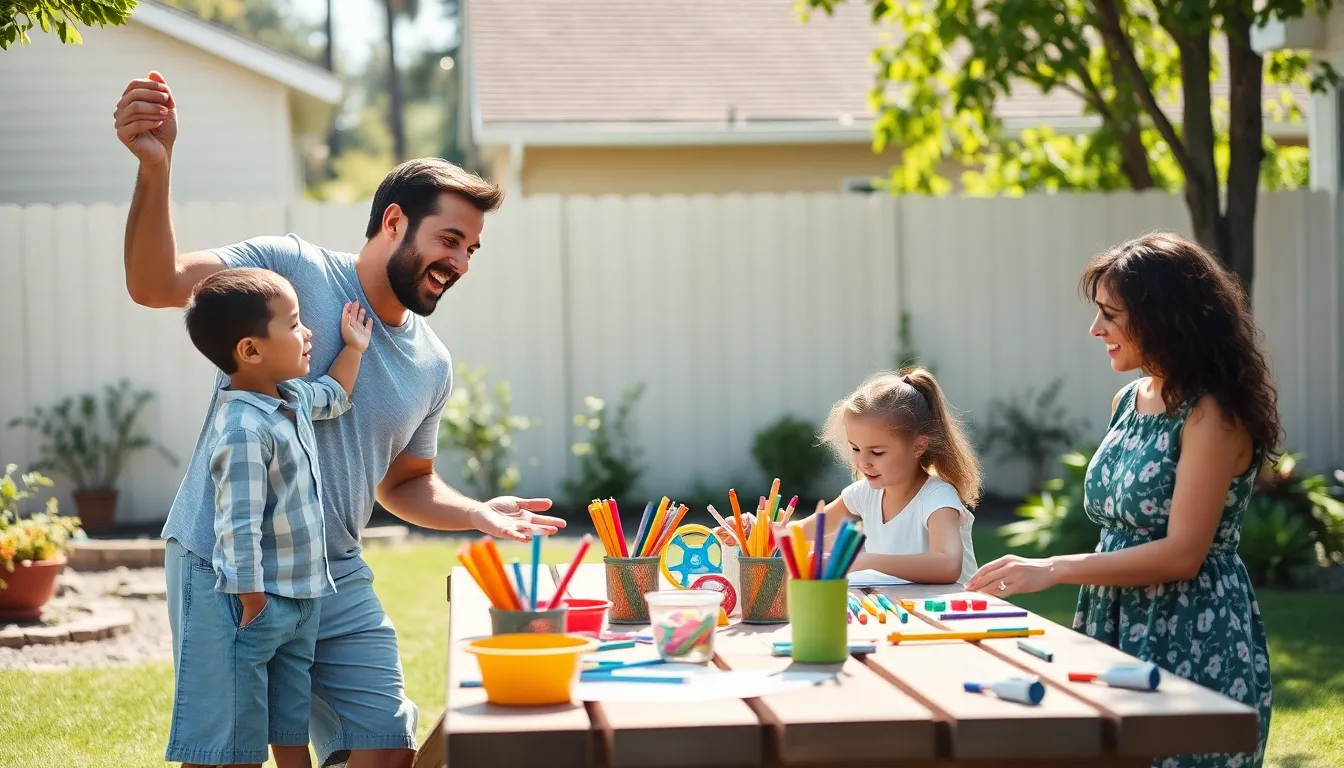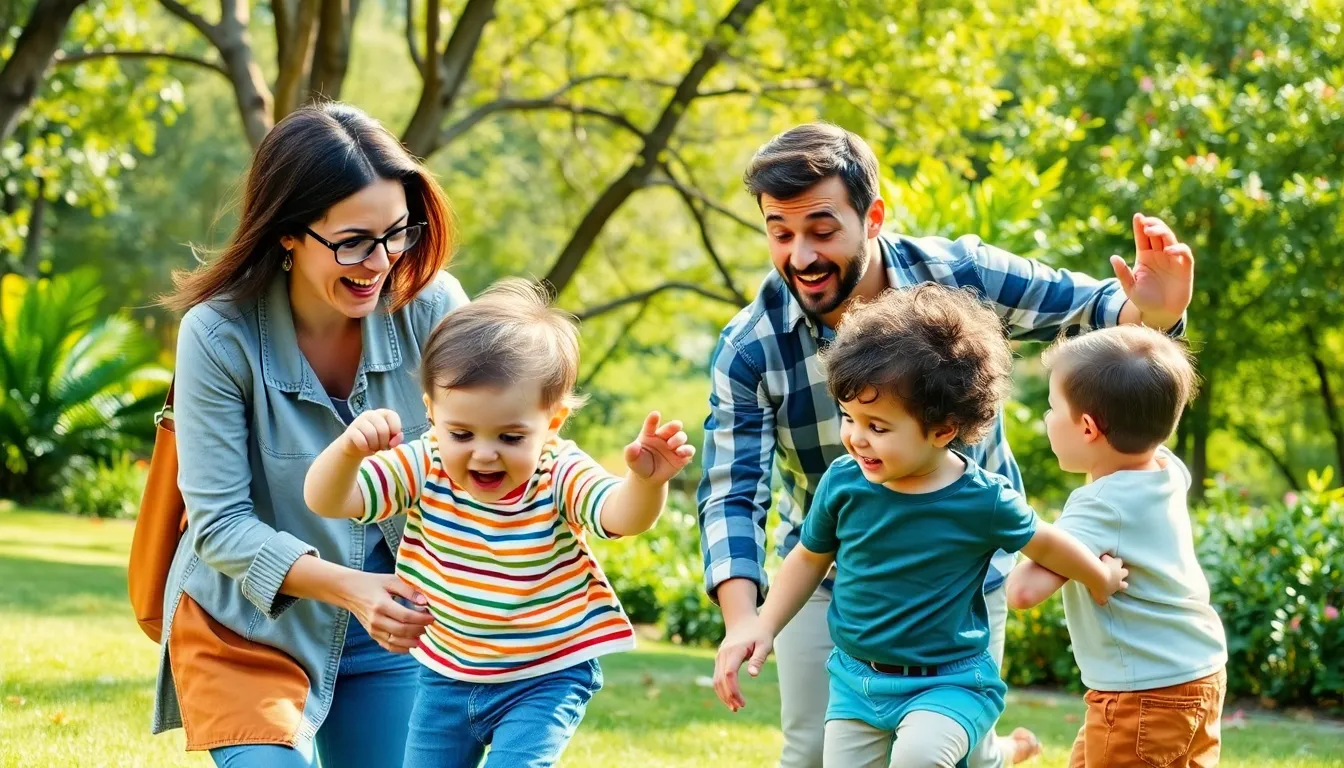Table of Contents
ToggleParenting isn’t just a job; it’s an Olympic sport filled with hurdles, unexpected twists, and the occasional toddler meltdown. As parents navigate this wild adventure, they often find themselves tangled in a web of stereotypes that can be as confusing as a baby’s sleep schedule. From the “helicopter parent” to the “free-range” approach, these labels can make anyone feel like they’re auditioning for a reality show rather than raising a child.
But let’s face it: parenting is messy, unpredictable, and downright hilarious at times. In a world where everyone seems to have an opinion on how to raise kids, it’s essential to break free from these stereotypes and embrace the unique journey each parent takes. So buckle up as we dive into the quirky world of parenting stereotypes, where laughter meets insight, and every parent can find a bit of truth in the chaos.
Understanding Parenting Stereotypes
Parenting stereotypes simplify diverse experiences into narrow categories. Such labels can mislead parents, making them feel confined by expectations.
Definition and Overview
Parenting stereotypes refer to generalized beliefs about how parents should behave or the types of parenting styles they should adopt. Terms like “helicopter parent” describe those overly involved in their children’s lives, while “free-range parent” suggests giving children more independence. These shortcuts overlook the complexities of individual parenting styles and the unique challenges each family faces. Labels may create pressure and guilt among parents, detracting from personal parenting journeys.
Historical Context
Historical perspectives shaped modern parenting stereotypes, reflecting societal norms and values. Over decades, cultural expectations on parenting shifted dramatically. The mid-20th century often depicted mothers as the primary caretakers, reinforcing traditional gender roles. As women’s rights advanced, notions of shared parenting emerged. More recent views encourage diverse styles, praising empowered choices. Nonetheless, remnants of old stereotypes persist, influencing how parents perceive their roles today.
Common Parenting Stereotypes

Many parenting stereotypes arise from societal expectations, influencing how individuals perceive their roles as parents.
Gender Roles in Parenting
Traditional gender roles assume mothers are primary caregivers while fathers fulfill the breadwinner role. These stereotypes ignore the reality that both parents can share caregiving responsibilities equally. Dads engaging in hands-on care, such as changing diapers or participating in school activities, challenge these outdated views. Mothers taking on leadership positions in the workplace also disrupt the conventional narrative. Redefining these roles encourages parents to collaborate on household tasks, allowing for a healthier family dynamic.
Cultural Influences
Cultural backgrounds shape parenting styles significantly. Variations in practices reflect differing expectations and values across communities. For example, collectivist cultures often prioritize family over individual needs, leading to more involved parenting approaches. In contrast, individualistic cultures may promote independence, influencing parenting to focus on self-sufficiency. These cultural lenses impact how parents view their responsibilities, shaping perceptions of success and fulfillment within the family unit. Understanding these influences helps parents navigate various expectations effectively.
Impact of Parenting Stereotypes
Parenting stereotypes significantly affect both parents and children, influencing perceptions and experiences. Understanding these impacts helps create a more supportive environment.
Psychological Effects on Parents
Parenting stereotypes create stress and anxiety for many mothers and fathers. They may feel pressured to conform to specific roles, leading to self-doubt and insecurity. Constant comparison to others often results in feelings of inadequacy. This emotional turmoil can diminish confidence and enjoyment in parenting, making it harder to embrace personal styles. Some individuals struggle with guilt when they fail to meet societal expectations. Parents might also experience isolation, fearing judgment from peers, which can deepen these psychological impacts. Overall, navigating these stereotypes distracts from the unique aspects of their parenting journey.
Effects on Children
Children may internalize the effects of rigid parenting stereotypes. These labels can pressure them to conform to perceived expectations, limiting their individuality. For instance, children raised under the “helicopter parent” stereotype may struggle with independence and decision-making. Conversely, those from “free-range” backgrounds may face challenges with supervision or guidance. Stereotypes can also lead to feelings of inadequacy among children who feel they don’t meet expectations based on their parents’ styles. Additionally, familial conflicts may arise as children observe the disconnect between parental actions and societal norms. Ultimately, understanding the broader effects of these stereotypes supports healthier family dynamics.
Challenging Parenting Stereotypes
Challenging parenting stereotypes requires critical thought and action. Breaking down traditional gender norms serves as a vital first step.
Breaking Down Gender Norms
Many parents question the roles assigned by society. Active fathers defy expectations by participating in childcare. They engage in school activities, help with homework, and take on chores, showcasing their nurturing side. Mothers challenge norms too, often balancing demanding careers while being present for their children. By embracing these varied roles, families model equality, benefiting children and parents alike. This shift encourages open conversations about parenting, leading to broader societal acceptance.
Promoting Inclusive Parenting
Inclusive parenting fosters a welcoming environment for diverse experiences. Parents can recognize and value different cultural backgrounds and family structures. Embracing practices from various cultures enriches children’s understanding of community and compassion. Active listening and open communication create a space for family members to share their unique perspectives. Celebrating differences cultivates empathy and respect, encouraging children to appreciate the richness of diversity. Each family’s distinct approach contributes to the collective discourse on modern parenting, paving the way for a more inclusive future.
Parenting isn’t a one-size-fits-all journey. By challenging stereotypes and embracing diverse experiences, parents can foster a more inclusive environment for themselves and their children. Recognizing the unique paths that each family takes helps break down the barriers created by societal expectations.
As parents redefine traditional roles and engage in open conversations, they pave the way for future generations to thrive without the weight of outdated norms. Celebrating individuality and promoting empathy enriches family dynamics and nurtures a compassionate community. In this ever-evolving landscape of parenting, it’s essential to find joy in the chaos and embrace the beautiful complexities that come with raising the next generation.




